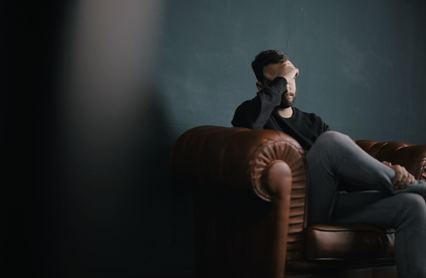Sadness that won’t go away, episodes of crying, dwelling on bad feelings. All of those familiar mood-disorder symptoms are common in women with depression — but not so much in men.
“When men are depressed, they may be less likely to express sadness and more likely to express anger, irritability and aggression,” says clinical psychologist Adam Borland, PsyD.
Other signs of depression in men can include:
Men and women also may share some basic depressive symptoms, like low energy, poor concentration and lost interest in activities they used to enjoy says.
Not all drops in mood are depression. Common sadness or irritability is usually temporary and triggered by something specific. Depression may have no clear trigger. And symptoms seem to take over your life (emotionally and physically), for two weeks or longer.
The effect on a man’s body
The thing about a mood disorder is that it’s not just an emotional problem. It can have physical effects too.
In women, depression can present as panic attacks or eating problems. Men, however, are more likely to complain of headaches, digestive problems or other physical aches and pains, says. They may have trouble sleeping or eating — or sleep or eat too much.
They also may have decreased sex drive and trouble performing in the bedroom.
It’s often easier for men to see a doctor for their physical issues than emotional ones. They may be less willing than women to talk about emotional issues or less likely to realize their physical symptoms are depression.
How to treat male depression
Men who may be depressed should start by seeing their primary care provider, who can rule out other health conditions and discuss ways to treat depression. Usually depression is treated with psychotherapy, medication or both.
Therapy can help patients uncover and change unhealthy thoughts and behaviors that could be contributing to depression. Sometimes it includes finding new ways of dealing with interpersonal conflict or other problems.
Antidepressants treat depression well, but can take several weeks to work fully. Symptoms may lift slowly and gradually.
There are dozens of safe and effective antidepressants available, but they don’t work the same in everyone. It may take more than one try for you and your doctor to find the right antidepressant for you.
What to do if a man is depressed
Many men won’t seek medical care for depression on their own. They may need encouragement from family or friends who’ve noticed a change in their ability to work, interact with others or function in everyday life.
If you think the man in your life may be depressed, here’s how you can help:
“When men are depressed, they may be less likely to express sadness and more likely to express anger, irritability and aggression,” says clinical psychologist Adam Borland, PsyD.
Other signs of depression in men can include:
- Impulsivity
- Apathy
- Low self-esteem
- Blaming others (Depressed women more often blame themselves.)
- Isolation from others
- Increased focus on work
- Needing to feel in control
- Substance abuse
- Gambling
- Risky sexual behavior
Men and women also may share some basic depressive symptoms, like low energy, poor concentration and lost interest in activities they used to enjoy says.
Not all drops in mood are depression. Common sadness or irritability is usually temporary and triggered by something specific. Depression may have no clear trigger. And symptoms seem to take over your life (emotionally and physically), for two weeks or longer.
The effect on a man’s body
The thing about a mood disorder is that it’s not just an emotional problem. It can have physical effects too.
In women, depression can present as panic attacks or eating problems. Men, however, are more likely to complain of headaches, digestive problems or other physical aches and pains, says. They may have trouble sleeping or eating — or sleep or eat too much.
They also may have decreased sex drive and trouble performing in the bedroom.
It’s often easier for men to see a doctor for their physical issues than emotional ones. They may be less willing than women to talk about emotional issues or less likely to realize their physical symptoms are depression.
How to treat male depression
Men who may be depressed should start by seeing their primary care provider, who can rule out other health conditions and discuss ways to treat depression. Usually depression is treated with psychotherapy, medication or both.
Therapy can help patients uncover and change unhealthy thoughts and behaviors that could be contributing to depression. Sometimes it includes finding new ways of dealing with interpersonal conflict or other problems.
Antidepressants treat depression well, but can take several weeks to work fully. Symptoms may lift slowly and gradually.
There are dozens of safe and effective antidepressants available, but they don’t work the same in everyone. It may take more than one try for you and your doctor to find the right antidepressant for you.
What to do if a man is depressed
Many men won’t seek medical care for depression on their own. They may need encouragement from family or friends who’ve noticed a change in their ability to work, interact with others or function in everyday life.
If you think the man in your life may be depressed, here’s how you can help:
- Acknowledge his depression.
- Offer your support.
- Promote healthy living and self-care.
- Focus on smaller, achievable daily goals.
- Involve a doctor or mental health professional.
- Report warning signs of suicide.
- National Suicide Prevention Lifeline at 800.273.8255.

 RSS Feed
RSS Feed
